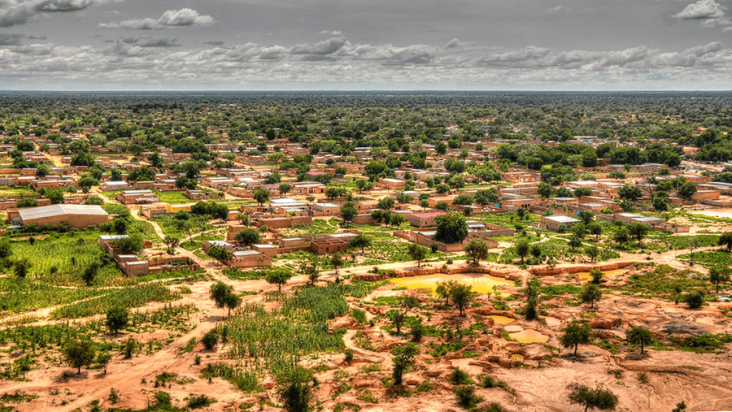- Where We Work
- Africa
- African Union
- Power Africa
- Trade and Investment
- Angola
- Benin
- Botswana
- Burkina Faso
- Burundi
- Cameroon
- Central Africa Regional
- Central African Republic
- Chad
- Côte d'Ivoire
- Democratic Republic of the Congo
- Djibouti
- East Africa Regional
- Eswatini
- Ethiopia
- Ghana
- Guinea
- Kenya
- Lesotho
- Liberia
- Madagascar
- Malawi
- Mali
- Mauritania
- Mozambique
- Namibia
- Niger
- Nigeria
- Republic of the Congo
- Rwanda
- Sahel Regional
- Senegal
- Sierra Leone
- Somalia
- South Africa
- South Sudan
- Southern Africa Regional
- Sudan
- Tanzania
- The Gambia
- Uganda
- West Africa Regional
- Zambia
- Zimbabwe
- Asia
- Europe and Eurasia
- Latin America and the Caribbean
- Middle East
- Mission Directory
Speeches Shim
Niger
POWER AFRICA FACT SHEET
NIGER ENERGY SECTOR OVERVIEW
Niger envisions reaching universal electricity access by 2035. However, Niger’s ability to achieve this ambitious goal is constrained by significant challenges. Niger’s government is working to expand its electricity supply and encourage investment in the energy sector to stimulate the economy. Niger is already taking critical steps to improve energy markets by creating, in 2015, a regulatory body ARSE (Autorité de Regulation du Secteur de l’Energie) to increase transparency and fair competition among numerous energy actors. The Government also created ANPER (Agence Nigérienne de Promotion de l’Electrification en milieu Rural), which is mandated to design, implement, and monitor rural electrification programs throughout the country. Other reforms include a joint Ministerial order that eliminates taxes on domestic solar energy production kits and wind generation equipment to enable a larger number of households to access electricity, a new electricity act that will authorize the establishment of independent power producers (IPPs), and ongoing work with consultants and the African Legal Support Facility to bolster the legal and regulatory framework for mini-grids.
GENERATION CAPACITY
-
Installed Capacity: 284 MW
-
Fossil Fuels: 100%
-
- Power Africa New MW to date Reached Financial Close: 0
CONNECTIONS
-
Current Access Rate: 11.2%
-
Rural: 0.4% Urban: 54.3%
-
- Households without Power: 3.8 million
- Target: Universal Access by 2035
- Power Africa New Off-Grid Connections: 28,667
INVESTMENT AND ENABLING ENVIRONMENT
Biggest Issues
- Limited technical capacity in the sector
- Creditworthiness of utility companies
- Security issues
Power Africa Interventions
- Technical assistance for rural electrification
- Transaction assistance for off-grid companies
- Technical assistance on competitive tenders
- Capacity building for local lenders
POWER AFRICA’S ENGAGEMENT IN NIGER
MW GENERATION
Power Africa maintains a regional USAID transaction advisor, based in Dakar, to respond to opportunities in West African countries, including Niger. Technical assistance and capacity building related to competitive tenders, power purchase agreements (PPAs), and local financing also contribute to advancing generation capacity in Niger.
CONNECTIONS
Power Africa is providing support to Niger to increase rural electrification rates and signed a formal letter of cooperation last year with the rural electrification agency, ANPER, to outline collaboration to accelerate energy access in the country. Power Africa is also providing technical assistance in multiple areas including mini-grid development, increased off-grid rural electrification, and off-grid policy and strategy development. Through a USAID regional transaction advisor, Power Africa supports private sector expansion into the Nigerien off-grid market and has facilitated 28,053 solar connections since 2013.
ENABLING ENVIRONMENT
Through the Climate Economic Analysis for Development, Investment, and Resilience (CEADIR) program, USAID is building the capacity of local lenders in the clean energy sector. Through the Commercial Law Development Program (CLDP), USAID and the US Department of Commerce have provided training to government officials on power project procurement and competitive tenders. This support seeks to enhance the enabling environment for private sector investment in Niger.
SUCCESS STORIES
A Blueprint for Rural Electrification: Building a Market for Mini-Grids in Niger
Niger has one of the lowest electrification rates in sub-Saharan Africa. Only one in seven Nigeriens have access to modern electricity services, and just four percent of rural residents have access through the national utility. Without power, there is no viable path for economic growth and development, and few prospects for people living below the poverty line.
But Niger has a plan. The Nigerien Agency for the Promotion of Rural Electrification (ANPER) developed ambitious targets to bring clean energy to rural households, thus paving the path for sustainable development. The Government of Niger created ANPER to design, implement, and monitor country-wide rural energy efforts to help Niger achieve universal rural electrification by 2035. ANPER realized that solar mini-grids offer a cost-effective, fast pathway to delivering first-time energy access to 1,000 rural villages. ANPER also knew that the country needed a robust feasibility study to attract international mini-grid developers and private sector investment.
In January 2019, with support from USAID and Power Africa, ANPER launched a nationwide feasibility study on mini-grid development, bringing Niger one step closer to its universal energy access goal.
Power Africa formed a consortium of partners, led by the U.S. small business ECODIT LLC, to join forces with ANPER in producing the Niger Mini-Grid Feasibility Study. This first-of-its-kind feasibility study proposes aligning telecommunications towers with solar mini-grids, thus improving the economics of rural electrification and attracting energy investors and developers to Niger.


Comment
Make a general inquiry or suggest an improvement.